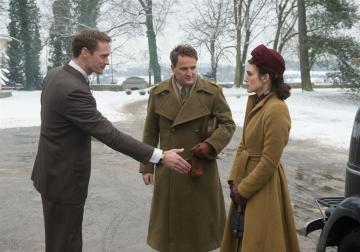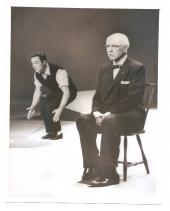Knightley shines brightly in problematic 'Aftermath'
“There’s nothing left here,” says a British officer, of what used to be Hamburg, Germany. “The French got the wine, the Yanks got the view, we got the ruins.”
Indeed, more bombs were dropped on Hamburg in one July 1943 weekend than on London during all of World War II. Fifty thousand civilians were incinerated in a tornadic firestorm rivaling Hiroshima.
In “The Aftermath,” six months following the Allied victory, Rachael Morgan (Keira Knightley) arrives amid the rubble, to reunite with her husband Lewis (Jason Clarke), an earnest British colonel in charge of reconstructing the shattered city.
First subtle hint of something strained between them: He greets her at the train station with a polite kiss on the cheek instead of the lips. But people drift apart in wartime, and it takes a while to reconnect. At least she’ll enjoy the grand new home that awaits her — one of precious few old mansions that escaped the war intact, untouched by the bombs and fires. Requisitioned for Lewis due to his military importance, it comes complete with its original Steinway grand and longtime servants.
- Starring: Keira Knightley, Jason Clarke, Alexander Skarsgard.
- Rating: R for sexual content, nudity, violence and some disturbing images.
It also comes, however, with its longtime previous owner, handsome German architect Stephen Lubert (Alexander Skarsgard) and his hostile daughter Freda (Flora Thiemann). Rachael is stunned to discover they’ll be sharing the place indefinitely.
No problem, Lewis assures her. Rachael will be totally in charge. The Luberts are relegated to a few attic rooms on the third floor. Stephen is charming and gracious, even if his motherless adolescent is not. He has resigned himself to their demoted position, humbly requesting extra firewood from the Brits and chopping it up himself.
Rachael is uncomfortable from the start about this arrangement. Increasingly unnerved, and unbeloved by the hired help.
“She’s making herself at home,” growls one staff member to another, “like a maggot in the bacon.”
Outside in the devastated city, things are equally tense. The rebuilding is not going swimmingly. Acute food and housing shortages are prompting anti-British riots. Die-hard cells of Hitler youth have gone underground, literally, plotting a resurrection of the Reich. One of them is Freda’s sexy — and dangerous — boyfriend.
Speaking of sex, in such a charged atmosphere, it’s only a matter of time before the external tensions and internal passions combine and combust for the protagonists. Lewis leaves for a while on business. Rachael hears the Samson & Delilah aria “Oeuvre ton Coeur.” (That’ll do it every time.) The deck seems stacked against her husband — he fails to respond to her tendresse. Stephen, on the other hand, responds quite nicely.
There’s splendor on the dining room table. And in a secret chalet in the snow-covered forest.
Director James Kent’s adaptation of Rhidian Brook’s 2014 novel benefits from a fine score by Martin Phipps, and by Franz Lustig’s terrific, washed out sepia-and-bluish cinematography, with powerful juxtapositions of Ms. Knightley’s gorgeous face and the bombed out shells left from Hamburg’s destruction. I think it’s about the crippling yet healing powers of sex. But grafting a heavy-breathing soap opera onto a serious historical situation is problematic. We spend a couple hours waiting for something more than just the melodrama to happen, but it never really does.
Blame the writing. Where’s the late great Kurt Vonnegut when we need him? If you’ve never seen George Roy Hill’s great 1972 film version of Vonnegut’s great “Slaughterhouse-Five,” do yourself a favor, find and watch it and reacquaint yourself with the similarly demolished Dresden, the saintly visionary Billy Pilgrim, the naked Montana Wildhack and the astonishing integration of a personal story with WWII and by-God interplanetary events.
In “The Aftermath,” unlike “Slaughterhouse-Five,” the Big Picture gets short shrift — and eventually lost — amid the romantic entanglements, even as the performances nobly (but not fully) work to compensate for it. Ms. Knightley — initially troubled, slowly easing into deeply conflicted — is emotionally moving and visually ravishing in her perfect period duds.
Mr. Skarsgard, with his piercing blue eyes and subtly aristocratic ways, is likewise effective.
The loss, grief and confusion of shellshocked people left to pick up the pieces of war reverberate through the sumptuous rooms and ruined landscapes.
In the end, it gets down to Rachael’s Choice.
Post-Gazette film critic emeritus Barry Paris: parispg48@aol.com.







